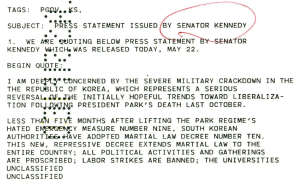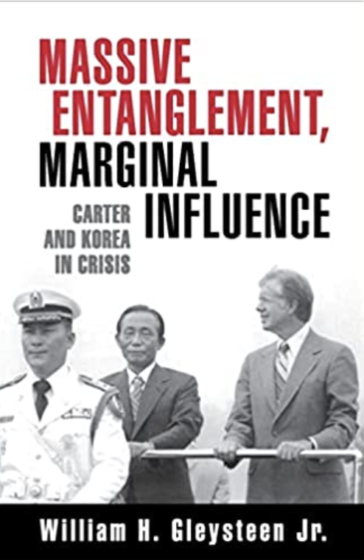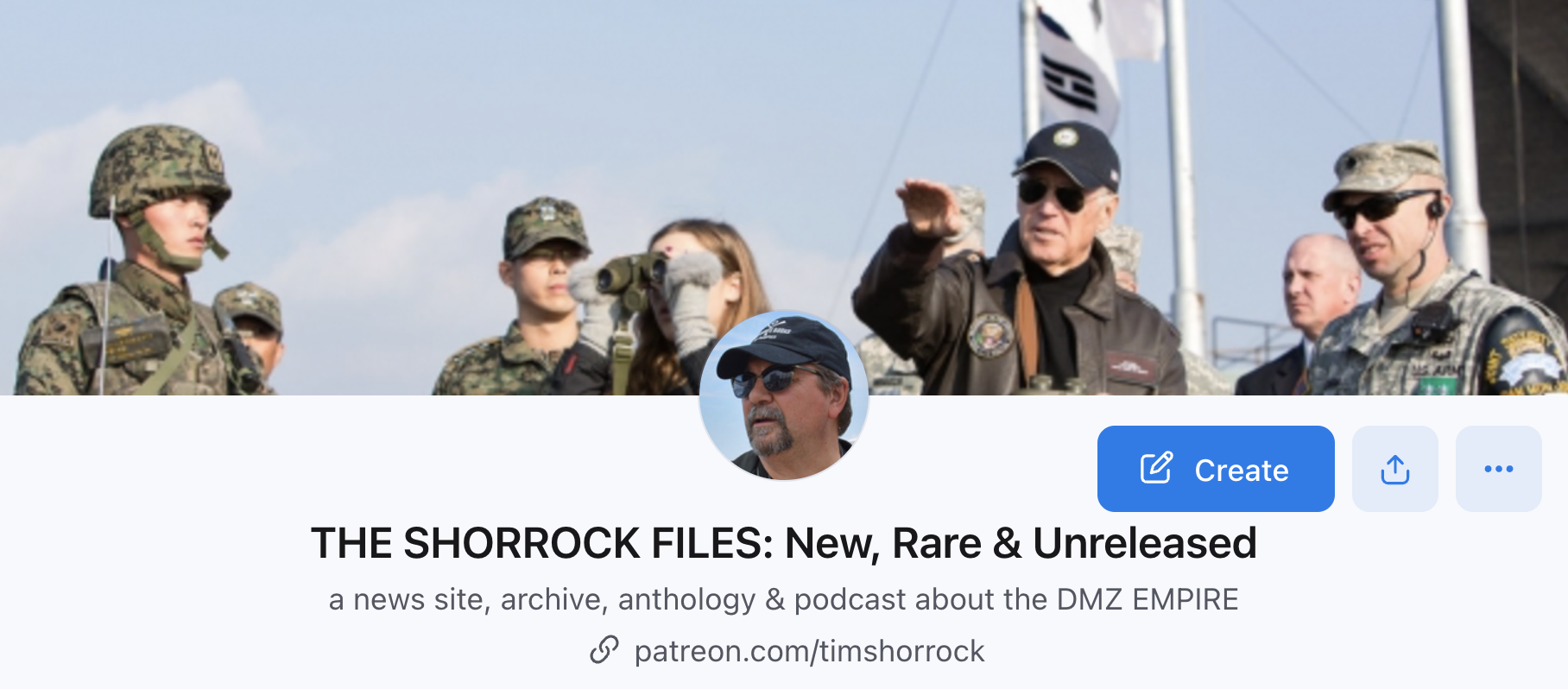BOX 2, FILE 6 (1979-1980)
This file contains key documents written by US ambassador William Gleysteen to the State Department in Washington during the critical months from November 1979 to May 1980. They are significant because Gleysteen was the head of the country team in Korea that managed the post-assassination political crisis in South Korea for the US government. His opinions carried great weight with the Carter administration. He also was the chief spokesman for the US government in its dealings with the South Korean government and military.

- 11/1979 – DOS/Cherokee, “Korea Focus – Congressman Wolff’s Proposal for Hearings.” In this document, Ambassador Gleysteen sharply warns the State Department and the US Congress not to hold a planned hearing on the “Korean leadership crisis,” as planned by a House committee chaired by US Representative Wolff. In particular, Gleysteen did not want hearings that looked in the assassination of President Park Chung Hee, in part because his assassin Kim Jae Gyu, the KCIA Director, was very close to both Gleysteen and General Wickham and the CIA. “I am sure that public hearing on the Korean situaiton would cause consternation, if not alarm, among many Koreans, and not just the Korean government,” he wrote.
- 12/12/1979 – DOS, “Conversation with NDP Assemblymen.” This cable describes a luncheon meeting Gleysteen held with four senior members of Kim Young Sam’s New Democratic Party on 12/11/1979. As he had done earlier in a meeting with Kim Y.S., Gleysteen “emphasized their responsibility for counseling moderation and patience within the opposition.” The lawmakers asked Gleysteen about his opinion about a possible attack from North Korea. “I told them I thought the chances of an attack from the North at present were slight.”
- 3/12/1980 – DOS, “Yet Another Assessment of ROK Stability and Political Development.” This documents is an important political assessment of the Korean political situation Ambassador Gleysteen. It’s significant because it shows how out of touch he and the US embassy (and the CIA that he relied on) was with the Korean population. On one hand, he understands well that Chun Doo Hwan has taken over the military. “Within the control structure a particularly worrisome phenomenon is the great power of Chun Doo Hwan, who has spread his intelligence security net throughout the military structure…Many people feel he already controls basic government policy.” But on the other, he is blissfully unaware of the political struggle going on inside Korean society. “The odds of a dangerous disruption, such as a military coup or massive student/worker uprising, to not seem high.” Both would unfold, in different order, within the next few weeks.
- REPLICA 3/12/1980 – DOS, “Yet Another Assessment of ROK Stability and Political Development.” A declassified version of the above document.
- 5/7/1980 – DOS, NODIS/Cherokee – “Korea Focus: Meeting with Chun Doo Hwan.” This cable describes Gleysteen’s upcoming meeting with Chun and what he plans to tell him. “I will have to mention that there is widespread suspicion in Korean society towards the government’s plans and that this causes us genuine concern…I am also going to caution Chun politely about attacking us.”
- 5/22/1980 – DOS, “Korea Sitrep, 1800, May 22 1980. This is a very significant cable from Ambassador Gleysteen to the Secretary of State, with the observation that Kwangju has “turned into a scene of horrors.” He reports in detail on the seizure of firearms and military vehicles by “rioters” in Kwangju, most likely based on the intercepted communications reported by the DIA in Box 4, File 2, “The Kwangju Insurrection.” He also reports on the movement of Special Warfare Command troops to and in Kwangju. He notes that “as of 2 a.m., May 22, Army troops in Kwangju were ordered to pull back from the city and to fire only if fired upon, and then to aim for the lower half of the body” – another report lifted from the DIA intercepts. Gleysteen interprets this “limited firing order” as a positive sign, showing a “desire for restraint…on part of ROK Army leaders.” He also notes the Korean military’s “concern with northward movement” of Kwangju citizens. And he makes this chilling observation: “If peaceful methods fail, government has 20th infantry division, plus airborne and special forces units, on alert in Cholla Namdo.”
- 5/22/1980 – DOS, “Military Investigation Links Kim Dae Jung with Student Disorders.” This is Gleysteen’s report about a Martial Law Command statement about Kim Dae Jung and the levelling for formal charges against him.”
- 5/22/1980 – DOS, “Your Memo to the Secretary for the PRC Meeting.” This is an important document in which Gleysteen prepares Secretary of State Muskie for the upcoming Policy Review Meeting at the White House on May 22 in the US. “As of now, 5:00 pm, Seoul time, the situation remains extremely serious, but some contacts between the citizens and the authorities have begun and we have been told authoritatively the military will not force their way back into the city for at least another two days unless things turn completely sour.” He also discusses the “admonitions” he and Wickham have made to the Korean government and military about “further force diversions to maintain internal security.”
- 5/22/1980 – DOS, “Possible further US statement on Kwangju Crisis.” Once again, Gleysteen’s chief concern is how the US will be perceived in Korea because of its cooperation with the Korean Army. He says the Korean military “will not undercut us” by taking forceful action in Gwangju “for at least two days.”
- 6/10/1980 – “US official visits to Korea.” In this cable, Secretary of State Edmund Muskie conveys displeasure with the recent visit to South Korea by John Moore, president of the US Export-Import Bank. “I am still disturbed by the aftermath of John Moore’s trip. For reasons not clear to me, he made statements to the press that are going to cause us continuing problems here.”

All documents can be viewed below in PDF format.
- Korea Focus | Congressman Wolff’s Proposal for Hearings | November 1979
- Conversation with NDP Assemblymen | December 12, 1979
- Yet Another Assessment of ROK Stability and Political Development (1) | March 12, 1980
- Yet Another Assessment of ROK Stability and Political Development (2) | March 12, 1980
- Korea Focus | Meeting with Chun Doo Hwan | May 7, 1980
- Korea Sitrep | May 22, 1980
- Military Investigation Links Kim Dae Jung with Student Disorders | May 22, 1980
- Possible Further US Statement on Kwangju Crisis | May 22, 1980
- Your Memo to the Secretary for the PRC Meeting | May 22, 1980
- Press Statement Issued by Senator Kennedy | May 23, 1980
- US Official Visit to Korea | For the Ambassador from Assistant Secretary Holbrooke | June 10, 1980
